
Teaching Statistics
Scope & Guideline
Transforming Teaching Methodologies in Statistics.
Introduction
Aims and Scopes
- Statistics Education Research:
Focuses on empirical studies that explore effective teaching strategies, curriculum development, and student learning outcomes in statistics education. - Integration of Technology in Teaching:
Explores the use of software and tools such as R, Shiny, and CODAP to enhance the teaching and learning of statistics, making complex concepts more accessible. - Statistical Literacy and Critical Thinking:
Promotes the development of statistical literacy among students, encouraging them to critically analyze data and understand the implications of statistical findings in real-world contexts. - Innovative Pedagogical Approaches:
Encourages creative and interactive teaching methods, including the use of edutainment, visual aids, and real-world data to engage students in the learning process. - Data Science Integration:
Focuses on the intersection of statistics and data science, preparing students for modern analytical challenges by incorporating data-centric thinking and practices.
Trending and Emerging
- Data Science and Analytics:
Recent publications increasingly focus on data science education, integrating programming and analytical skills into the curriculum, reflecting the growing importance of data-driven decision-making in various fields. - Use of Edutainment and Interactive Learning:
There is a marked trend toward incorporating edutainment and interactive learning strategies, which aim to make statistics more engaging and relatable for students, enhancing their overall learning experience. - Application of Real-World Data:
A growing emphasis on using real-world data in teaching statistics encourages students to apply statistical concepts to actual scenarios, fostering deeper understanding and relevance. - Addressing Statistics Anxiety:
Emerging themes include strategies to mitigate statistics anxiety among students, recognizing the psychological barriers that can impact learning and performance in statistics. - Ethics in Statistics Education:
There is an increasing focus on ethical considerations in statistics, particularly concerning data interpretation and representation, which is crucial in today's data-rich environment.
Declining or Waning
- Traditional Statistical Methods:
There appears to be a reduced emphasis on classical statistical methods and techniques, as the journal increasingly prioritizes innovative and technology-driven approaches to teaching statistics. - Basic Statistical Theory:
Topics centered on foundational statistical theories, such as basic probability and introductory statistical tests, have waned, possibly due to a growing preference for applied and practical approaches. - Non-Interactive Teaching Methods:
The decline in publications focusing on non-interactive or lecture-based teaching methods suggests a shift toward more engaging and participatory learning experiences. - Standalone Statistical Software Reviews:
There is a noticeable decrease in standalone reviews of statistical software, as the journal moves towards integrated discussions of software tools within broader educational contexts.
Similar Journals
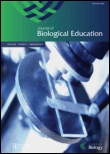
JOURNAL OF BIOLOGICAL EDUCATION
Innovating Biological Learning for Tomorrow's EducatorsThe JOURNAL OF BIOLOGICAL EDUCATION is a prominent academic journal published by Routledge Journals, Taylor & Francis Ltd, focusing on innovative research and practices in the field of biological education. With an ISSN of 0021-9266 and E-ISSN 2157-6009, this journal serves as a vital resource for educators, researchers, and students dedicated to enhancing the teaching and learning of biology. Since its inception in 1967, it has maintained a consistent commitment to promoting best practices and integrating new methodologies into biological curriculum design and pedagogy. The journal holds a respectable impact factor and ranks in the Q2 category for both Agricultural and Biological Sciences and Education, reflecting its influence and authority within these fields. Researchers are encouraged to engage with its diverse range of articles that address critical issues in biological education, showcasing cutting-edge research and practical approaches. Its reach is particularly significant in the United Kingdom and globally, making it a key platform for disseminating knowledge and fostering collaboration among professionals.

TEACHING AND TEACHER EDUCATION
Leading the Way in Teacher Training ResearchTEACHING AND TEACHER EDUCATION is an esteemed academic journal dedicated to advancing the fields of education and teacher training. Published by Pergamon-Elsevier Science Ltd, this journal has garnered substantial recognition, holding a prestigious Q1 category in Education as of 2023, and ranking #160 out of 1543 in Scopus's Social Sciences Education category, placing it in the top 89th percentile. Since its inception in 1985, the journal has been pivotal in disseminating cutting-edge research, theoretical developments, and practical applications for educators and policy-makers. The journal's scope encompasses a wide array of topics, including but not limited to pedagogical practices, teacher education curriculum, and innovative teaching methodologies. While it does not operate under an open access model, it remains influential by providing a critical platform for rigorous scholarship that impacts teaching practices globally. Located in the United Kingdom, TEACHING AND TEACHER EDUCATION is a vital resource for researchers, professionals, and students who are dedicated to shaping the future of education.
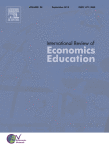
International Review of Economics Education
Enhancing Understanding: Insights into Economics EducationThe International Review of Economics Education, published by Elsevier Science Ltd, serves as a vital platform for disseminating high-quality research in the field of economics education. With an ISSN of 1477-3880 and an E-ISSN of 2352-4421, this esteemed journal features a range of scholarly articles that evaluate and enhance teaching methodologies, curriculum development, and educational practices in economics. Operating out of the United Kingdom, and recognized within the Q2 category in Education for 2023, it stands out in the competitive landscape of social sciences with a Scopus rank of #333 out of 1543, positioning it in the 78th percentile among its peers. Researchers, educators, and students will find the journal's focus on innovative economics teaching approaches particularly relevant for advancing pedagogical techniques and improving student engagements. While the journal does not currently offer Open Access options, its contributions are essential for anyone dedicated to the scholarly advancements in economics education from 2003 to the present and beyond.
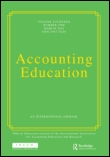
Accounting Education
Elevating Standards in Accounting Education ResearchAccounting Education is a leading academic journal dedicated to advancing the field of accounting education, published by Routledge Journals, Taylor & Francis Ltd. With an impressive Q1 ranking in both the fields of Accounting and Education, the journal serves as a vital platform for educators, researchers, and practitioners interested in the evolving pedagogies and methodologies in accounting education. The journal’s focus is on disseminating high-quality research that addresses contemporary challenges and innovations within accounting teaching, supported by an extensive archive from 1992 to the present. While currently not open access, the journal is known for its rigorous peer-review process, ensuring that only the most impactful research is published. With its high Scopus rankings, including a notable 92nd percentile in Business, Management and Accounting, Accounting Education provides invaluable insights and fosters professional development, making it an essential resource for anyone committed to enhancing accounting education.
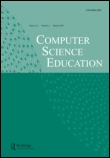
Computer Science Education
Empowering Educators through Cutting-edge ResearchComputer Science Education is a prestigious journal published by ROUTLEDGE JOURNALS, TAYLOR & FRANCIS LTD, focusing on the critical intersection of computer science and educational practices. Established in 1988, this journal has become a cornerstone for researchers, educators, and practitioners interested in enhancing teaching methodologies and learning outcomes in computer science. With an impressive ranking within the top quartile (Q1) in both Computer Science (miscellaneous) and Education categories for 2023, as well as high Scopus percentile placements, it underscores its significance in advancing the discipline. The journal offers a platform for innovative research encompassing diverse educational environments and approaches, and while it currently does not offer open access options, it remains committed to disseminating high-quality scholarly work. As a vital resource for anyone looking to contribute to and understand the evolving landscape of computer science education, Computer Science Education continues to shape the future of learning in this dynamic field.

Chemistry Teacher International
Innovating Teaching Strategies for Tomorrow's ChemistsChemistry Teacher International is a prominent peer-reviewed journal dedicated to the field of chemistry education, published by WALTER DE GRUYTER GMBH. With its Open Access policy since 2018, this journal ensures that research is widely disseminated to educators, researchers, and practitioners globally. Located in Berlin, Germany, it aims to promote innovative teaching methodologies and practical applications in chemical sciences. The journal has consistently achieved a Q2 ranking in both the Chemistry (Miscellaneous) and Education categories as of 2023, reflecting its relevance and impact within the academic community. Over its converged years from 2019 to 2024, Chemistry Teacher International fosters a collaborative platform for sharing research, insights, and pedagogical strategies, thereby contributing to the advancement of chemistry education on a global scale.
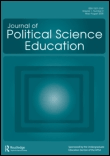
Journal of Political Science Education
Advancing Political Literacy Through EducationThe Journal of Political Science Education is a distinguished peer-reviewed journal published by Routledge Journals, Taylor & Francis Ltd, based in the United Kingdom. Since its inception in 2005, this journal has been dedicated to advancing research and discourse at the intersection of political science and education, offering insightful analyses and innovative pedagogical practices to enhance the teaching and learning of political science. As a reputable journal in the field, it is currently indexed in the Scopus database, holding a prestigious position within the top quartiles (Q2) in both Education and Sociology and Political Science categories. The journal aims to foster a vibrant scholarly community, encouraging contributions that promote critical thinking and engagement in political issues among students and educators alike. With an emphasis on accessibility and impact, the Journal of Political Science Education serves as a vital resource for researchers, educators, and practitioners seeking to enhance their understanding of the educational frameworks that shape political science knowledge and civic engagement.

Revista Eureka sobre Ensenanza y Divulgacion de las Ciencias
Unlocking the Future of Science Education TogetherRevista Eureka sobre Ensenanza y Divulgacion de las Ciencias is a premier open-access journal dedicated to advancing the fields of education and science communication. Published by the University of Cadiz in Spain, this journal has established itself as a vital platform since its inception in 2004. With an ISSN of 1697-011X, it aims to disseminate innovative research and pedagogical strategies that enhance the understanding and teaching of scientific disciplines. As of 2023, it holds a Q3 categorization in Education with a Scopus rank of #989/1543, reflecting its commitment to academic excellence and relevance. The journal's open-access model ensures that valuable research is readily available to educators and researchers worldwide, fostering a community engaged in the promotion of effective science education. With a focus on bridging theoretical and practical applications, Revista Eureka invites contributions that spark dialogue and inspire new methodologies in science teaching and dissemination.

TEACHING OF PSYCHOLOGY
Exploring Cutting-edge Approaches in Psychology InstructionTEACHING OF PSYCHOLOGY is a distinguished academic journal published by SAGE Publications Ltd, focusing on the field of psychology education. Established in 1975, this journal has carved out a vital niche in the academic landscape, facilitating the dissemination of innovative teaching practices, research outcomes, and pedagogical strategies that enhance the learning experience in psychology. With an impressive H-index indicating its influence, TEACHING OF PSYCHOLOGY is ranked in the second quartile for Education and third quartile for Psychology (Miscellaneous) in 2023, reflecting its pivotal role in these fields. The journal boasts a robust Scopus ranking, placing it within the 55th percentile for Social Sciences - Education and the 42nd percentile for General Psychology, demonstrating its relevance and reach among scholars and practitioners alike. Although it does not offer open access, it remains a crucial resource for educators, researchers, and students seeking to enhance their understanding and application of psychological principles in educational settings. By contributing to the ongoing dialogue about effective teaching methodologies in psychology, the journal aims to inspire and inform educators, fostering an environment of rigorous academic inquiry and practical application.

Journal of Mathematics Teacher Education
Inspiring Educators to Innovate and ExcelJournal of Mathematics Teacher Education, published by SPRINGER, serves as a pivotal platform for scholarly communication in the fields of Education and Mathematics. With a distinguished Q1 ranking in both disciplines and exceptional Scopus rankings—placing it in the top 94th percentile for Mathematics and the 84th percentile for Education—the journal is dedicated to advancing research and practice in mathematics education from a global perspective. Established in 2005 and converging towards 2024, it invites contributions that investigate innovative teaching strategies, curriculum development, and teacher education methodologies. Although the journal does not offer Open Access, its rich collection of empirical studies, reviews, and theoretical articles provides invaluable resources for educators, researchers, and students aiming to elevate the quality of mathematics instruction. Situated in Dordrecht, Netherlands, the Journal of Mathematics Teacher Education remains a significant asset to the academic community, fostering discussions that drive progress and enhance student learning experiences.